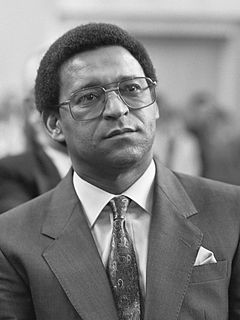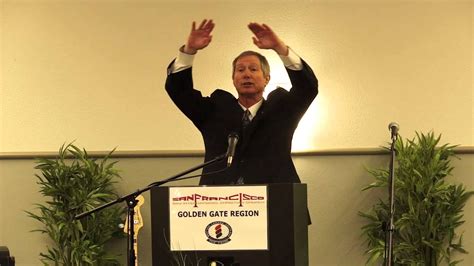A Quote by D. A. Carson
Some have argued that the Christian notion of Scripture is not epistemologically sustainable. It's not philosophically possible with rigor to uphold the Christian understanding of Scripture.
Quote Topics
Related Quotes
If your starting point for understanding humanity is a racialist viewpoint, with superiority and inferiority projected onto people because of the color of their skin, then it's so easy to take the next step of justifying that point theologically and reading it into the Christian scripture. And that makes it harder to understand what scripture is actually saying!
Some people are ignorant of the world but educated in Scripture, and are therefore prone to missing the relevance of Scripture - these sometimes, later, amidst life's challenges and doubts, turn from the faith; other people are ignorant of Scripture but educated in the world, and are therefore prone to missing the truth of Scripture - they are often those who ridicule the faith. The apologist stands somewhere in the center. He articulates where some are prone to understanding the truth in beauty, others the beauty in truth - that of a spiritual Creator in relation to his scientific creation.
I taught what was clear in Acts 11:26: SAVED = CHRISTIAN = DISCIPLE, simply meaning that you cannot be saved and you cannot be a true Christian without being a disciple also. I taught that, to be baptized, you must first make the decision to be a disciple, and then be baptized. I taught that their baptism was invalid because a retroactive understanding of repentance and baptism was not consistent with Scripture.
Often a non-Christian knows something about the earth, the heavens, and the other parts of the world, about the motions and orbits of the stars and even their sizes and distances... and this knowledge he holds with certainty from reason and experience. It is thus offensive and disgraceful for an unbeliever to hear a Christian talk nonsense about such things, claiming that what he is saying is based in Scripture. We should do all that we can to avoid such an embarrassing situation, which people see as ignorance in the Christian and laugh to scorn.
I believe scripture is not just resilient but rebellious against its abuse by people. Scripture says it refuses to be used in that way for long. That is why the gospel that has been used by the oppressors is the same gospel that liberated the oppressed: They were reading the same book. Something in the DNA of Christian faith and in the Bible agitates against that kind of misuse.
That the religious right completely took over the word Christian is a given. At one time, phrases such as Christian charity and Christian tolerance were used to denote kindness and compassion. To perform a "Christian" act meant an act of giving, of acceptance, of toleration. Now, Christian is invariably linked to right-wing conservative political thought -- Christian nation, Christian morality, Christian values, Christian family.
All appeals to Scripture are appeals to interpretations of Scripture. The only real question is: whose interpretation? People with differing interpretations of Scripture cannot set a Bible on a table and ask it to resolve their differences. In order for the Scripture to function as an authority, it must be read and interpreted by someone. According to "solo" Scriptura, that someone is each individual, so ultimately, there are as many final authorities as there are human interpreters.



































